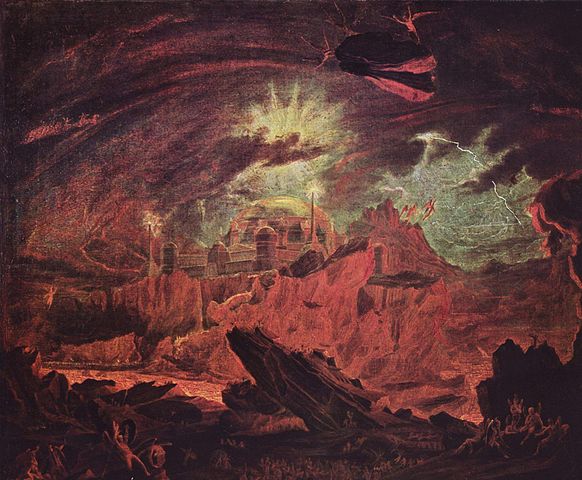Prose Poem Excerpt by Kim Triedman
Editor’s Note: Kim Triedman’s long prose poem Hadestown (CW Books, 2013) was a finalist for the 42 Miles Press Poetry Award in 2012. A sequence of brief prose paragraphs—sometimes as short as a single line—Hadestown is haunting, frightening, raw, and hard to stop reading.
It's also a contemporary riff on the final labor of Herakles, in which the Greek hero descends to the underworld to capture the three-headed dog Cerberus. Triedman’s vision mixes the River Styx, the gods Hermes and Athena, and the mythical ferryman Charon with the Staten Island Ferry, a decaying industrial cityscape, and mountains of ashes that evoke 9/11.
“Part mythic quest, part post-apocalyptic travel narrative,” says poet Daniel Tobin of Hadestown on the CW Books website, it's "Euripides meets Blade Runner. Beckett meets Survivor.”
As Triedman's nameless hero notes near the beginning:
There’s litter everywhere—bottles, needles, used condoms—and by the waterline the waves are edged in sulfur foam. ‘Neptune Bay,’ a sign informs me, ‘Swim at your own risk.’
We’re very happy to reprint the following excerpt as part of the TW Reading Series. For more information, see the CW Books page for Hadestown.

There’s something harrowing about the landscape here—pitted, colorless, absence of trees. For miles on end industry sputters and chokes, fouls itself, like something teetering on the cruel edge of extinction. The sun fires itself sideways, hits hard at the side of my face. Through the window I count out the smokestacks, the ragged outposts of chain-link. Something catches my eye. Along the narrow gravel shoulder, two young deer, fuzzed and fresh, bounding at full speed too close to the highway.
• • •
We make it to the bus depot, which doubles as a Costco parking lot. I have never been here before. The pavement bucks and rears, weeds press up along the seams like great green varicosities. Distances telescope; minutes extrapolate to hours. Figures hang darkly around the edges of things, and high above seagulls wheel and shriek, slicing through the air like small nightmares.
• • •
It has always read like a fairy tale to me—the hero, the hardships, the slaying of beasts. I try to bring him into focus sometimes but he is too many men, like someone viewed through a long evening of wine. It’s no wonder, I suppose, starting out like that—one foot on the mountain and the other far below, tripping over rooted things. Even the bloodlines, even the love of a king was not enough, always at odds with the tyranny of his queen. I wonder at what that might do to a body: the snakes and all. The guilt.
• • •
My compass has gone missing. East/west up/down right/wrong—nothing comes clear anymore. With each step I take I must regroup, recalibrate my sights, my expectations. I look to the sun, but it is no help. I scrutinize Herman, try to discern what holds him cleanly to his path, but he just laughs at me and pulls a face, tells me to get lost. I don’t even bother with the woman; she wears her moods like a weapon. When I least expect it, she reaches out to grab me by the arm; steer me out of harm’s way.
• • •
The air has changed, abruptly. There is a calm, there is a mildness that says: something is coming, something is about to end. Even the leaves are limned in rust, and squirrels scrabble in the dirt, running out of time. On the long walk to the ferry, we speak little. There are no signposts here; I can no longer remember the names of my children. Certain simple adjectives elude me: tidy; cautious; straight. I hold quiet to my center, focus on each breath, drop traces of my past like pebbles behind me. The deepest reaches of my memory grow shallower by the minute.
• • •
An endless wait, for what we do not know. The ferry is in, but it is slow to unload and even slower to take on new passengers. They have closed off all the accesses. People mill around, irritable, checking their watches and flipping their phones. I keep to myself, off to the side, in the shade of a languishing maple. There is no wind and no need of it, the air so benign as to impose nothing on the skin. I look up to pass the time: contrails parsing a church-blue sky.
• • •
A sudden flurry of movement among the people nearest the ferry. It passes through the crowd like wind through wheat, and reluctantly I move toward it. There are too many of us for the boat—that much is clear. We jostle one another and vie for position, press in toward the gangplank. The ferryman glares at us, reaches out to take the tickets. He is sinewy and bent, his fingers crabbed in upon themselves like ancient claws. He cannot understand what we think we are hurrying toward.
Art Information
- "Fallen Angels in Hell" by John Martin (circa 1841); public domain.
 Kim Triedman is the author of two other poetry collections: Plum(b) (Main Street Rag Press, 2013), a finalist for the 2012 Backwaters Press Book Award; and Bathe in It or Sleep, winner of the 2008 Main Street Rag Chapbook Competition. Her first novel, The Other Room (Owl Canyon Press, 2013), was a finalist for the James Jones First Novel Award.
Kim Triedman is the author of two other poetry collections: Plum(b) (Main Street Rag Press, 2013), a finalist for the 2012 Backwaters Press Book Award; and Bathe in It or Sleep, winner of the 2008 Main Street Rag Chapbook Competition. Her first novel, The Other Room (Owl Canyon Press, 2013), was a finalist for the James Jones First Novel Award.
She is also the editor of Poets for Haiti: An Anthology of Poetry and Art (Yileen Press, 2010), a volume which grew out of a collaborative benefit she co-organized after the 2010 earthquake. She is a graduate of Brown University and lives in the Boston area.
